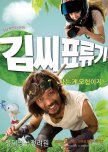This review may contain spoilers
This is not light-hearted, has some comedy but not central, and is not a romance per se
Review
I consider this an 8/10 despite what I consider to be some significant issues with certain aspects and particularly the ending. But the "meat" of the story is very good. Castaway on the Moon* is a poignant and introspective South Korean film that dives deeply into complex themes of mental health, isolation, and human connection. Despite its seemingly quirky premise—a man stranded on an island in the middle of Seoul’s Han River—it’s far from a lighthearted comedy or romance. The story follows two individuals at their lowest points, finding an unexpected bond through their shared struggles. While there are hints of mild romantic feelings, the film avoids explicit romance, focusing instead on mutual understanding and empathy between two people who feel alienated from society.
The film’s strength lies in its unflinching exploration of mental health and social issues, making it a compelling watch for those who appreciate thought-provoking narratives. It’s not a movie for everyone, though. If you’re looking for a funny, uplifting, or romantic story, this isn’t it. The tone is heavy, and the pacing is deliberate, which may not suit viewers seeking lighter fare. Personally, I wouldn’t rewatch it, but I wouldn’t leave the room if someone else put it on—it’s engaging enough to hold your attention, even if it’s not a film you’d revisit.
**Recommendation**: Watch this if you enjoy deep, character-driven stories that tackle mental health and societal pressures. Skip it if you prefer rom-coms or lighthearted entertainment.
---
Spoilers
Some viewers have questioned the plausibility of the protagonist, Kim Seong-geun, being unable to escape the island, given its proximity to Seoul. However, real-life cases show that isolation can happen even in populated areas. For example, there have been instances of people trapped in overlooked spaces—like a patient left on an outdoor hospital landing who died because no one heard their calls. This supports the film’s premise that Seong-geun could be stranded so close to civilization. That said, the film suggests he might not have *wanted* to be rescued. At a certain point, his focus shifts from escape to survival, and he finds purpose in sustaining himself on the island. This is evident in his determination to make black bean noodles, a task that symbolizes his need to reclaim agency after feeling like a failure in his job and finances.
The connection between Seong-geun and the female protagonist, Kim Jung-yeon, who observes him from her apartment, is another point of contention. Their bond, built on minimal communication through messages, feels intense but underdeveloped. I find it hard to believe that their brief exchanges could foster such a strong connection. As a psychologist I found the characters to be deeply troubled—Seong-geun with severe depression after attempting suicide, and Jung-yeon with what appears to be agoraphobia, social anxiety, possible hoarding tendencies, and trauma hinted at by facial scarring and her avoidance of her parents. Without significant therapy, it’s likely both would revert to their previous states after the film’s events. Seong-geun’s forced removal from the island leaves little indication he’s equipped to handle his old life, and while Jung-yeon makes progress by venturing outside, her underlying issues remain unaddressed.
The film’s ending is deliberately ambiguous, offering a soft resolution that leaves their futures uncertain. There’s a suggestion of a potential friendship, or perhaps a faint romantic spark, but I don’t buy the latter—they’re too damaged to be in a state receptive to romance nor would they be very good for each other romantically. His "FU" response to her not messaging him back is an example of how volatile both of their emotional states are. As friends, they might support each other’s healing, but both need serious professional help. Seong-geun’s struggles seem rooted in depression, while Jung-yeon’s complex issues, including possible trauma, make her a more intricate case. The film frustratingly never reveals the cause of her condition, which feels like a missed opportunity to flesh out her character.
On a side note, some of Seong-geun’s survival tactics were off-putting. His casual handling of bird droppings and using his own waste as fertilizer—without apparent concern for hygiene—felt gross and unrealistic, as he’d likely contract parasites. Eating unwashed items also triggered my germaphobic side. But, on a practical note, you have to be even more careful in a survival situation with stuff like wound care and sanitation. Granted you can't be perfect but being oblivious and careless could lead to fatal results. These moments detracted from the film’s otherwise grounded portrayal of survival.
Overall, *Castaway on the Moon* raises compelling questions about resilience and connection but leaves you uncertain about the characters’ futures. It’s a thought-provoking film, but its ambiguity and lack of resolution may leave some viewers wanting more closure.
I consider this an 8/10 despite what I consider to be some significant issues with certain aspects and particularly the ending. But the "meat" of the story is very good. Castaway on the Moon* is a poignant and introspective South Korean film that dives deeply into complex themes of mental health, isolation, and human connection. Despite its seemingly quirky premise—a man stranded on an island in the middle of Seoul’s Han River—it’s far from a lighthearted comedy or romance. The story follows two individuals at their lowest points, finding an unexpected bond through their shared struggles. While there are hints of mild romantic feelings, the film avoids explicit romance, focusing instead on mutual understanding and empathy between two people who feel alienated from society.
The film’s strength lies in its unflinching exploration of mental health and social issues, making it a compelling watch for those who appreciate thought-provoking narratives. It’s not a movie for everyone, though. If you’re looking for a funny, uplifting, or romantic story, this isn’t it. The tone is heavy, and the pacing is deliberate, which may not suit viewers seeking lighter fare. Personally, I wouldn’t rewatch it, but I wouldn’t leave the room if someone else put it on—it’s engaging enough to hold your attention, even if it’s not a film you’d revisit.
**Recommendation**: Watch this if you enjoy deep, character-driven stories that tackle mental health and societal pressures. Skip it if you prefer rom-coms or lighthearted entertainment.
---
Spoilers
Some viewers have questioned the plausibility of the protagonist, Kim Seong-geun, being unable to escape the island, given its proximity to Seoul. However, real-life cases show that isolation can happen even in populated areas. For example, there have been instances of people trapped in overlooked spaces—like a patient left on an outdoor hospital landing who died because no one heard their calls. This supports the film’s premise that Seong-geun could be stranded so close to civilization. That said, the film suggests he might not have *wanted* to be rescued. At a certain point, his focus shifts from escape to survival, and he finds purpose in sustaining himself on the island. This is evident in his determination to make black bean noodles, a task that symbolizes his need to reclaim agency after feeling like a failure in his job and finances.
The connection between Seong-geun and the female protagonist, Kim Jung-yeon, who observes him from her apartment, is another point of contention. Their bond, built on minimal communication through messages, feels intense but underdeveloped. I find it hard to believe that their brief exchanges could foster such a strong connection. As a psychologist I found the characters to be deeply troubled—Seong-geun with severe depression after attempting suicide, and Jung-yeon with what appears to be agoraphobia, social anxiety, possible hoarding tendencies, and trauma hinted at by facial scarring and her avoidance of her parents. Without significant therapy, it’s likely both would revert to their previous states after the film’s events. Seong-geun’s forced removal from the island leaves little indication he’s equipped to handle his old life, and while Jung-yeon makes progress by venturing outside, her underlying issues remain unaddressed.
The film’s ending is deliberately ambiguous, offering a soft resolution that leaves their futures uncertain. There’s a suggestion of a potential friendship, or perhaps a faint romantic spark, but I don’t buy the latter—they’re too damaged to be in a state receptive to romance nor would they be very good for each other romantically. His "FU" response to her not messaging him back is an example of how volatile both of their emotional states are. As friends, they might support each other’s healing, but both need serious professional help. Seong-geun’s struggles seem rooted in depression, while Jung-yeon’s complex issues, including possible trauma, make her a more intricate case. The film frustratingly never reveals the cause of her condition, which feels like a missed opportunity to flesh out her character.
On a side note, some of Seong-geun’s survival tactics were off-putting. His casual handling of bird droppings and using his own waste as fertilizer—without apparent concern for hygiene—felt gross and unrealistic, as he’d likely contract parasites. Eating unwashed items also triggered my germaphobic side. But, on a practical note, you have to be even more careful in a survival situation with stuff like wound care and sanitation. Granted you can't be perfect but being oblivious and careless could lead to fatal results. These moments detracted from the film’s otherwise grounded portrayal of survival.
Overall, *Castaway on the Moon* raises compelling questions about resilience and connection but leaves you uncertain about the characters’ futures. It’s a thought-provoking film, but its ambiguity and lack of resolution may leave some viewers wanting more closure.
Was this review helpful to you?






















